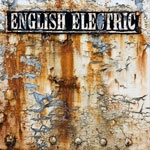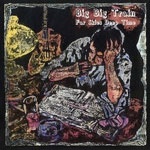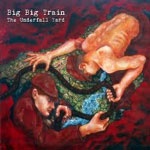Features
Big Big Train's Greg Spawton: The Daily Vault Interview (2012)
by Jason Warburg
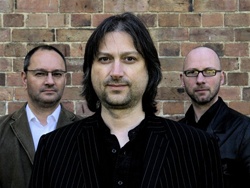 |
| Greg Spawton (center) with Big Big Train cohorts Andy Poole (l) and David Longdon (r) |
For five years now, every time a package has arrived in the mail from Bournemouth, its U.S. Customs stamp cursorily marked “CDs,” this writer’s pulse has quickened. When the first one arrived in summer 2007, I’d never heard of Big Big Train. Today, three full albums and a remarkable EP later, I count myself as an unabashed fan. Progressive rock music is, by its very nature, difficult to pull off well. It can easily come off as overblown or impersonal or esoteric or even predictable in its attempts to be different. Big Big Train’s music is consistently none of these; instead, it is intelligent, diverse, lush, driving, imaginative, engaging and at times virtuosic.
The group was founded by Andy Poole and Greg Spawton in 1989 and today consists of Spawton (guitar, bass, keyboards, composition), Poole (bass, guitar, production), David Longdon (vocals, flute, composition and more), Dave Gregory (guitar, ex-XTC) and Nick D’Virgilio (drums, ex-Spock’s Beard), often joined by a varied guest cast of modern prog luminaries that on their recent album English Electric Part One includes Andy Tillison (The Tangent) and Martin Orford (IQ). Over the course of a recent week, co-founder Greg Spawton indulged the Vault with a wide-ranging interview addressing the new album and what’s next, the possibility of live dates, Joni Mitchell and James Taylor, and the ongoing search for the transcendent.
[Editor’s Note: The interview was conducted by e-mail, resulting in many English spellings (ploughing, realised, etc.) making their way into the text. These have been preserved for authenticity, and should be read aloud with the proper English inflection for full effect.]
Daily Vault: English Electric Part One has been out for a couple of weeks at this point. It seems to me this is the group’s most anticipated release yet, and it comes at a time when it feels like the progressive rock genre is having another of its periodic resurgences. How has the response to the album been so far?
Greg Spawton: English Electric has come out at an interesting time for progressive rock. I can't remember any period where there was such a run of high-quality releases. I did become a little bit concerned about how much time the album would get in the limelight before other releases came along, but I think it's worked out just fine for us. We planned the promotional campaign very carefully and the response has been extremely positive. The album appears to have achieved more “reach” than anything else we've done, including The Underfall Yard. Sales have been higher than we hoped for and, in just the first two weeks of release, it's been listened to many more times on Spotify than any of our previous releases.
That’s great to hear. So, just to recap a bit, EEP1 is the group’s sixth studio album, and its second full album (plus a very substantial EP) with David Longdon, Nick D’Virgilio and Dave Gregory on board along with you and Andy Poole. Like many groups in the prog genre, Big Big Train has been through quite a few lineup changes over the years. Each has moved the band forward in some way, but this particular lineup feels like it might be the sort of thing you’ve been reaching for all along, five guys with thoroughly compatible musical sensibilities and a strong commitment to this music.
There was actually another album, called Bard, which we have deleted, so EEP1 is, in fact, album number seven. It is the second full-length release with the new line-up. We have certainly experienced a number of line-up changes over the years and for a while it felt like things would never really settle down. Then, it started to come together. Back in 2007 we began working with Nick and that made us think about whether we could strengthen other areas of the band. As if by magic, David came into our life via a phone call from our sound engineer Rob Aubrey. Rob said he'd recorded this chap called David Longdon who, he felt, would be the perfect singer for BBT. I spoke to David a few times and we tried him out on the title track of The Underfall Yard. He turned out to be the frontman we had needed all along. Andy and I are huge XTC fans and we'd wondered about asking Dave Gregory to play for us, but had not plucked up the courage. It turned out that David had worked with Dave previously and so he called him and it went from there. Thing is, I love these guys. We have all become close friends who share a similar outlook. They also happen to be extraordinary musicians who pour creativity into Big Big Train.
I think that sense of common purpose (not to mention talent) really shows through in the music -- it's a really rich brew. I love also that it's dramatic music that's full of emotion even when tackling topics that some might regard as fairly esoteric. BBT has a way of bringing historical narratives and specific times and places to life in your music that's pretty remarkable. It feels like that focus on storytelling has become really central to BBT's music over the last few albums.
It's very important to me that music has an emotional connection. Andy is a big Steely Dan fan, but I can't get on with them as their music, clever as it is, just doesn't move me. I'm glad you have picked up on the storytelling aspect of what we do. I have written a number of personal songs over the years but I didn't want to keep ploughing the “failed relationship” furrow. I discovered that telling good stories with the songs can resonate just as much with listeners as songs built on personal experiences. Of course, finding a good story is one thing, but it's recognising and representing the deeper and more universal themes within the stories that make the songs interesting.
Yes. Just for example, I thought it was remarkable how much emotion the group brought to “Winchester From St. Giles Hill,” which on the surface is about exactly what the title implies: walking up a hill to see the view. But when David sings “A river flowing from the chalkhills / Through the water meadows / And the open fields” with the music surging behind him, I get chills. The emotional subtext is that he is seeing and feeling the entire history of England itself laid out before him, and is deeply moved by it.
Glad to hear it had such an impact. History is too often thought of as a dry subject. I find it intensely dramatic and moving and we tried to capture that within “Winchester From St Giles' Hill.” One of David's gifts is to find the emotional core in the material. The connection of the onlooker with the landscape below the hill and the people that helped to forge the land is, for me, a soulful thing and that's what David zeroed in on. Danny Manners’ piano arrangement sought to emulate the movement of the river and Dave added drama to the song with the string arrangement and guitar solo.
That's, I think, where the magic happens with Big Big Train -- how you guys manage to fit all of these different musical components together. There's the basic rock instrumentation, but then you add flute and violin and on some tracks full string and horn sections, and a lot of complex vocals and harmonies, and even banjo on songs like "Uncle Jack" and "Hedgerow." It must be a bit of a puzzle figuring out how the pieces fit together in the arranging and mixing process, when to add to and when to subtract from individual tracks, and where.
I've always appreciated music where the level of detail is such that you can hear something new even after repeated listens. We spend a lot of time piecing the elements together for songs until we find the right combination of sounds. We're finishing “East Coast Racer,” a track for Part Two, at the moment, and we're getting down to very fine levels of detail in a song which has a number of movements over 15 minutes. It can sometimes feel overwhelming and, occasionally, strong ideas have to make way for the good of the song as a whole. That can be a shame and can cause protracted discussion within the band. Even at the mixing stage, Rob may express forthright opinions if he feels something isn't working or something more is needed. But we work things through and pan for gold. [N.B.: "Rob" is Rob Aubrey, who mixed, mastered and otherwise fiddled with EEP1 and most other BBT recordings.]
Count me intrigued by your description of “East Coast Racer.” I'd like to ask a few questions about some of the individual tracks on Part One, but first there's one other point I wanted to just touch on with you. There was quite a lively discussion on the BBT Facebook page a few weeks ago about how much of a Genesis influence can actually be heard in Big Big Train's music, versus how much is simply projected by fans by virtue of your and Andy's acknowledged admiration for Genesis, and David and Nick's previous associations with the band. Personally, I find the conversation interesting mostly because while I feel like the influence is there, I'm actually not a big fan of early Genesis, whereas I'm very fond of the last few BBT albums. The common touch points that I hear are elaborate arrangements, imaginative storytelling, an interest in history, and a uniquely English flavor to the songs. That, and the occasional guitar or keyboard part with a Hackett/Banks vibe.
I think our music appeals to fans of Genesis but that isn't the same as saying it sounds like Genesis and sometimes those two things get confused. And for reviewers who are inundated with new music it's an easy reference point when they are putting their thoughts into words. Having said that, we're all Genesis fans and if a hint of their sound appears in our songs from time-to-time, as it will do, I'm very relaxed about it. And, certainly, Genesis were great storytellers and that is something we have drawn from in our approach. However, there are many influences on our music which all go into the melting pot and we're certainly not restricted to ’70s bands, so our sound will inevitably have moved on from any early progressive template. One of the things that strikes me about the BBT forum is the wide tastes of BBT listeners on there. A thread about Joni Mitchell is as likely to get people talking as something about Porcupine Tree or Marillion.
Very true. Alright then, I promised a few questions about the individual songs on English Electric Part One. The album is framed by songs contrasting a claustrophobic life below ground – as explored in “The First Rebreather” and “A Boy In Darkness” in particular – with moments of joy in the wide-open countryside (“Uncle Jack” and “Hedgerow,” as well as “Winchester From St. Giles Hill” and "Upton Heath”). At what point did you realize that was going to be a major theme of EEP1? To what degree did that realization shape the arranging and mixing process, and decisions about run order?
We didn't start off with any concept or theme. All we set out to do was to bring together the best collection of songs which would work together as an album. After preparing the early demos we realised that a couple of themes were beginning to emerge by happenstance. David had “A Boy in Darkness” and I had “The First Rebreather,” both set underground. David had “Uncle Jack” and I had a tune (with no lyrics at the time) called “Hedgerow.” The character Uncle Jack (who is a real person) was a man who had a fascination for hedgerows. Jack was also a coal miner. So, the main theme began to emerge and then that influenced the development of other songs such as “Upton Heath” and “Winchester From St Giles' Hill.” That also got us thinking about musical motifs, so we began to look again at some of the arrangements. I worked the keyboard solo theme from “Rebreather” into “Upton Heath” and David worked some of the words from “Uncle Jack” into “Hedgerow.” The coda of “Summoned By Bells” is actually based on the ending of “East Coast Racer” on Part Two. We ended up with about 105 minutes of material which was too long for one album but too short for a decent double so that gave us an opportunity to write a couple of other songs which seek to bring everything together. In particular, one song on Part Two is called “The Permanent Way” which is an attempt to summarise the album in eight minutes while standing on its own as a song. I'm really pleased with it. As to the running order, that was left until very late. We expected “Hedgerow” to be the last track but at one stage “East Coast Racer” was going to be the first track on Part One. However, that's quite a challenging piece of music so we decided to swap some of the songs around. We must have had five or six different attempts at getting the track order right. It can make a real difference to an album.
Let me say that I think “Hedgerow” is a stellar closer and have been listening to it probably more than any other track on the album in recent days. So many interesting elements to it. The main opening riff played by Dave feels like it has a strong Byrds influence. Pretty soon Nick comes in with an unusual-for-him straight 4/4 backbeat behind it and it gathers tremendous drive. Then David adds lush vocals and all sorts of quirky textures and sounds begin to mingle in the background, and then the horns arrive, and the strings, and the middle section featuring a violin solo, and the closing march with all the layered vocals and horn section fanfare… I guess what I’m getting at it is, it’s quite a musical smorgasbord.
“Hedgerow” is a good example of how we are stronger as a unit than as individuals. I'd had the title and that little 12-string riff for a couple of years and worked it up into a demo. My demos are very humble; David's sound amazing because he has that voice, whereas mine need a lot of imagination. The original demo ended on a fade-out of the violin solo, but Andy insisted that we had to end with a reprise of the main vocal part. That wasn't easy, but I found a way. Dave worked up the guitar parts and then Nick put down this really tight backbeat which gave it a lovely ’60s feel. David wrote the words and developed the melody and harmonies and sketched out some of the parts for the brass. Rachel Hall took my sketch of the violin solo and made it her own. Danny Manners re-arranged my basic piano parts into something glorious and Dave Desmond and the brass band came in to do their stuff. The big singalong at the end was Andy's idea and we asked as many people as we could to get involved. Rob mixed the track, but even then we felt there was something missing. Dave then came up with the Mellotron solos to complete the arrangement. It's quite an uplifting tune and a good way to end, although it has its moments of pathos.
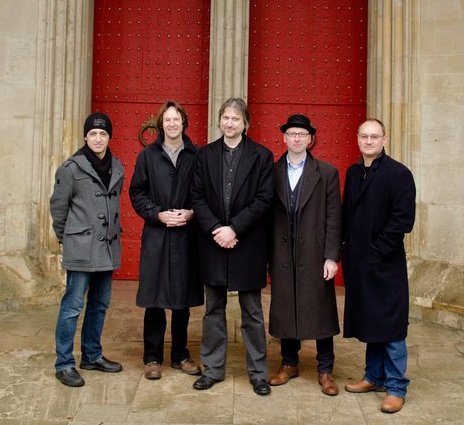 |
| Nick D'Virgilio, Dave Gregory, Greg Spawton, David Longdon, Andy Poole |
Indeed. So, speaking of perhaps unanticipated musical connections, I’ve been wanting to ask a question about “Upton Heath.” Maybe it’s just that the subject matter and choices of instruments go together so naturally, but it sure feels to this James Taylor fan like there must be some sort of musical relationship between “Upton Heath” and “Country Road” – that feeling of uplift walking through quiet countryside as mandolin and violin lead the way.
There is definitely a connection, now you mention it. I don't think it is something we were thinking about during the writing and arranging sessions, but it is there.
So Joni Mitchell isn’t such a reach after all… interesting. Anyhow, heading into the home stretch here, back to the big picture. In recent years Big Big Train has been almost exclusively a studio band, and now you have Nick in the band, who is based in the U.S. and has a substantial time commitment to Cirque du Soleil. And yet, I have caught tantalizing hints here and there about potential live dates. Anything you can share on that subject at this point?
At the moment the time we have Nick is very limited. We're flying him over in the New Year and we have just a couple of days with him before he has to head back. However, he is hopeful of more time off in the future and we are beginning to plan with that in mind. Even then, it's not easy as our release schedule for the next year or so is busy. Part Two is out in March, a single and the special double edition of English Electric is out in September and a triple CD called Station Masters will be out in early 2014. Whilst we have some admin support, we manage ourselves and I know, from past experience, how much time that release schedule and all the promotional work that goes with it will take. We need to be realistic and not bite off more than we can chew and so the show we're planning will follow on from Station Masters in 2014. If it all comes off, it'll be presented as an evening with Big Big Train and we hope to record it for a DVD release. It'll include the brass band and a string section.
Live BBT with brass and strings as well… wow. That could be pretty spectacular, and seems like a great goal to shoot for as the next 18 months unfold. Now, zooming the lens out even farther, I’m wondering perhaps the most basic thing of all: why progressive rock? What do you find special and compelling about the form?
My first experience with progressive rock was hearing “Dancing With the Moonlit Knight” in the late ’70s. Up until then I'd probably only listened to my parents' music, some of which was very good, but all of which would fit squarely within the mainstream. But this song, by a band called Genesis, it was different. I found it astounding. Why was the song so lengthy? Why were there so many twists and turns? How could it be so loud and aggressive at one moment and so pastoral and gentle at others? What did the lyrics mean? What instruments were creating the sounds? As I went on to explore PFM and Van Der Graaf Generator and other prog bands I began to understand the genre and the motivation of the musicians behind it, but those initial impressions are, for me, still relevant and explain the attraction. Progressive rock is compelling primarily because it provides the musician with a vehicle to write and perform music which can reach beyond the ordinary. I mentioned in an interview with Brad Birzer a comment that Paul Stump made in his book The Music's All That Matters, and it bears repeating. Stump says that progressive musicians are “hankering after the transcendent.” That about sums it up.
Does it ever. That feels like the perfect place to wrap this up. Thanks again for your time and best of luck with all of Big Big Train’s upcoming ventures.
Very much enjoyed this interview, Jason. Thank you for making it interesting.
